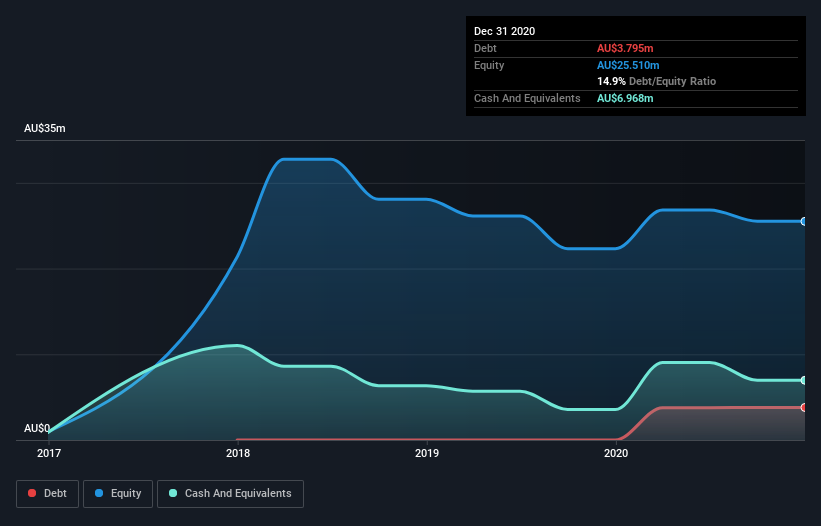Is Epsilon Healthcare (ASX:EPN) Using Debt In A Risky Way?
Legendary fund manager Li Lu (who Charlie Munger backed) once said, 'The biggest investment risk is not the volatility of prices, but whether you will suffer a permanent loss of capital.' It's only natural to consider a company's balance sheet when you examine how risky it is, since debt is often involved when a business collapses. As with many other companies Epsilon Healthcare Limited (ASX:EPN) makes use of debt. But the more important question is: how much risk is that debt creating?
When Is Debt A Problem?
Debt is a tool to help businesses grow, but if a business is incapable of paying off its lenders, then it exists at their mercy. Ultimately, if the company can't fulfill its legal obligations to repay debt, shareholders could walk away with nothing. However, a more frequent (but still costly) occurrence is where a company must issue shares at bargain-basement prices, permanently diluting shareholders, just to shore up its balance sheet. Of course, the upside of debt is that it often represents cheap capital, especially when it replaces dilution in a company with the ability to reinvest at high rates of return. The first step when considering a company's debt levels is to consider its cash and debt together.
See our latest analysis for Epsilon Healthcare
What Is Epsilon Healthcare's Debt?
The image below, which you can click on for greater detail, shows that at December 2020 Epsilon Healthcare had debt of AU$3.79m, up from none in one year. But on the other hand it also has AU$6.97m in cash, leading to a AU$3.17m net cash position.
How Strong Is Epsilon Healthcare's Balance Sheet?
According to the last reported balance sheet, Epsilon Healthcare had liabilities of AU$6.13m due within 12 months, and liabilities of AU$5.20m due beyond 12 months. Offsetting these obligations, it had cash of AU$6.97m as well as receivables valued at AU$1.53m due within 12 months. So its liabilities outweigh the sum of its cash and (near-term) receivables by AU$2.83m.
Given Epsilon Healthcare has a market capitalization of AU$36.2m, it's hard to believe these liabilities pose much threat. However, we do think it is worth keeping an eye on its balance sheet strength, as it may change over time. Despite its noteworthy liabilities, Epsilon Healthcare boasts net cash, so it's fair to say it does not have a heavy debt load! The balance sheet is clearly the area to focus on when you are analysing debt. But it is Epsilon Healthcare's earnings that will influence how the balance sheet holds up in the future. So if you're keen to discover more about its earnings, it might be worth checking out this graph of its long term earnings trend.
Over 12 months, Epsilon Healthcare reported revenue of AU$7.4m, which is a gain of 53%, although it did not report any earnings before interest and tax. Shareholders probably have their fingers crossed that it can grow its way to profits.
So How Risky Is Epsilon Healthcare?
Statistically speaking companies that lose money are riskier than those that make money. And we do note that Epsilon Healthcare had an earnings before interest and tax (EBIT) loss, over the last year. And over the same period it saw negative free cash outflow of AU$11m and booked a AU$11m accounting loss. With only AU$3.17m on the balance sheet, it would appear that its going to need to raise capital again soon. With very solid revenue growth in the last year, Epsilon Healthcare may be on a path to profitability. By investing before those profits, shareholders take on more risk in the hope of bigger rewards. The balance sheet is clearly the area to focus on when you are analysing debt. But ultimately, every company can contain risks that exist outside of the balance sheet. For instance, we've identified 5 warning signs for Epsilon Healthcare (2 are a bit concerning) you should be aware of.
At the end of the day, it's often better to focus on companies that are free from net debt. You can access our special list of such companies (all with a track record of profit growth). It's free.
This article by Simply Wall St is general in nature. It does not constitute a recommendation to buy or sell any stock, and does not take account of your objectives, or your financial situation. We aim to bring you long-term focused analysis driven by fundamental data. Note that our analysis may not factor in the latest price-sensitive company announcements or qualitative material. Simply Wall St has no position in any stocks mentioned.
Have feedback on this article? Concerned about the content? Get in touch with us directly. Alternatively, email editorial-team (at) simplywallst.com.

